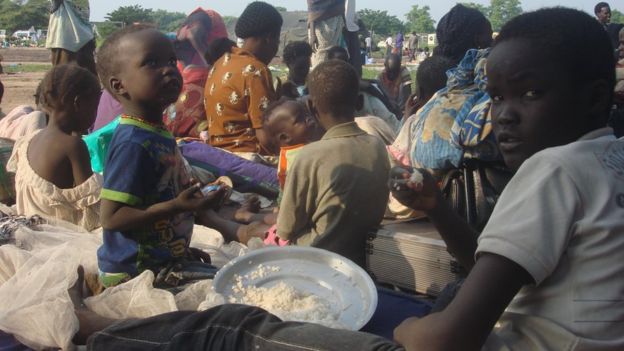
This article is more than
9 year oldThe city is quiet, with no reports of helicopter gunships in the sky or tanks on the streets.
President Salva Kiir and his rival, Vice-President Riek Machar, announced a ceasefire which came into force on Monday at 15:00 GMT.
Clashes between troops loyal to the two men had threatened a recent peace deal.
South Sudan became independent from Sudan in 2011 but its short history has been marred by civil war.
Mr Kiir and Mr Machar are under intense diplomatic pressure to end the violence.
The UN said some 36,000 people had been left homeless by the fighting, with 7,000 of them taking refuge at its compounds.
The US said anyone impeding efforts to end the fighting would be held fully accountable.
The UN called for an immediate arms embargo, as well as attack helicopters to strengthen its 13,000-strong peacekeeping force.
Two Chinese UN peacekeepers and one South Sudanese UN worker were among those killed in the fighting.
US National Security Adviser Susan Rice said: "This senseless and inexcusable violence - undertaken by those who yet again are putting self-interest above the well-being of their country and people - puts at risk everything the South Sudanese people have aspired to over the past five years."
BBC Sudan analyst James Copnall says the latest clashes have traumatised Juba and shredded a peace deal between Mr Kiir and Mr Machar, agreed last August.

He said there were also doubts over how far both men were in command of their forces.
The UN refugee agency urged neighbouring states to keep their borders open for a possible influx of asylum-seekers.
Uganda has tightened security along its border with South Sudan, making it difficult for people to cross, it added.
However, Uganda's military said it it intended to evacuate its nationals trapped in the conflict.
Tens of thousands of Ugandans moved to South Sudan after its independence to take advantage of business opportunities.
UN Secretary-General Ban Ki-moon said: "Yet again, the leaders of South Sudan have failed their people. Rarely has a country's conduct squandered so much promise so quickly."
Mr Ban said an "immediate" arms embargo should be imposed on South Sudan, political and military leaders blocking the peace deal should be sanctioned and the UN mission to the country should be fortified.
On Monday afternoon, an army spokesman told the BBC that soldiers loyal to Mr Kiir had been ordered back to barracks.
Any who resisted the order, by loitering or looting, would be arrested, he said.

It seems a disagreement at a checkpoint between rival soldiers led to a shootout on Thursday night in which five soldiers died. This quickly escalated into serious fighting from Friday onwards. Tensions have been high since April, when Mr Machar returned to Juba under a peace deal following a two-year civil war. He took a 1,300-strong protection force with him and they were supposed to start joint patrols with forces loyal to President Kiir. But a lack of trust between the two sides means the patrols have not begun.
There are concerns that what we are seeing is a repeat of what happened in December 2013. The two-year civil war started after clashes between rival soldiers in Juba and degenerated into nationwide conflict in which tens of thousands died. The war was fought broadly between South Sudan's biggest ethnic groups - the Dinka, led by Mr Kiir, and the Nuer, under Mr Machar.

The international community played a major role in the creation of South Sudan and has tried to exercise some influence since independence in 2011. The UN and US have called for an immediate end to fighting, a call echoed by the East African regional group which brokered the recent peace deal.